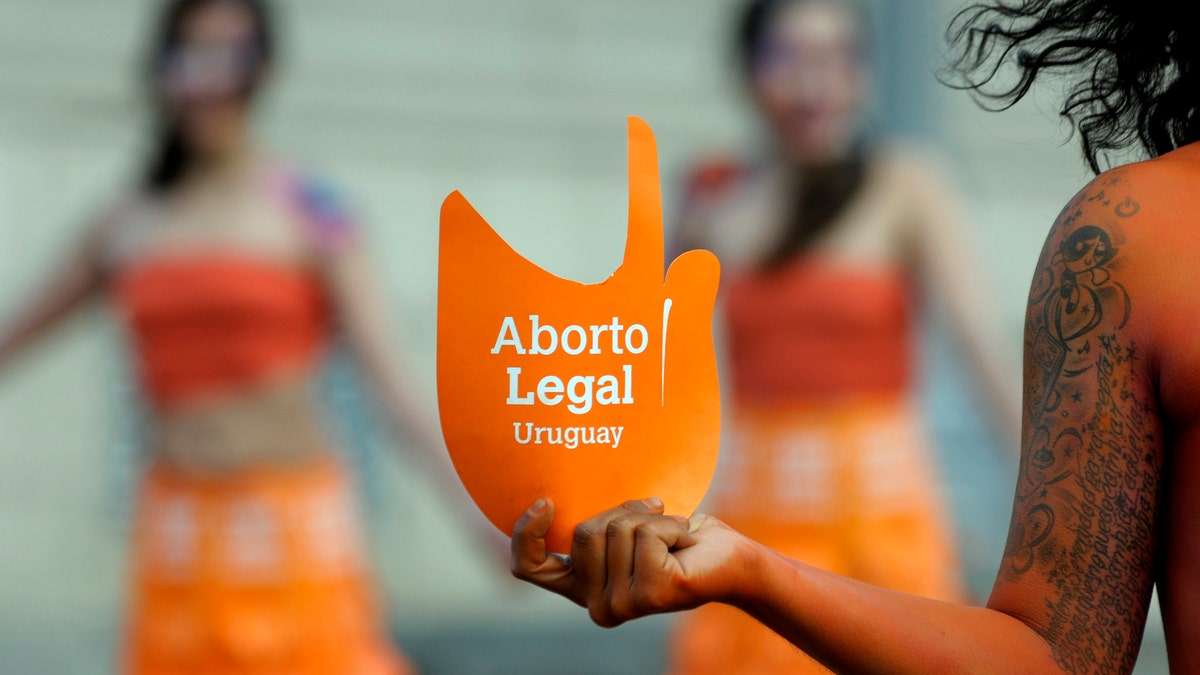
Pro abortion activists demonstrate in front of the Uruguayan congress in Montevideo, Uruguay, Tuesday, Sept. 25, 2012. (AP Photo/Matilde Campodonico)
In 1916, Margaret Sanger opened the nation’s first family planning clinic in Brooklyn, and women lined up for birth control information. Within nine days, Sanger was jailed for her advocacy, but a movement for women’s health was born.
Today, Planned Parenthood of New York City (PPNYC) carries on Sanger’s commitment to helping women access reproductive health care —birth control, lifesaving cancer screenings, abortion and sex education. In 2011, nearly 50,000 New Yorkers visited our four health centers in Manhattan, Brooklyn, the Bronx and Staten Island. Twenty-nine percent of our patients are Latino/as. Our patients are college age and middle aged, married, single, questioning and represent nearly every nationality and cultural background.
one fundamental truth holds: all people deserve high-quality, affordable health care and the respect to make personal, complex health care decisions free from political interference.
Yet, in the great melting pot of New York City, the one thing our patients and supporters appear to have in common is a fundamental understanding that reproductive health care –specifically abortion– is a deeply personal and often complex decision for a woman to consider if and when she needs it. Ultimately, decisions about whether to choose adoption, end a pregnancy, or raise a child must be left to a woman, her family and her faith, with the counsel of her health care provider.
On this 40th anniversary of the landmark Supreme Court decision Roe v. Wade, what we hear every day in our health centers is reflected nationwide. Outdated “pro-choice” and “pro-life” labels just don’t fit the way most of us think and talk about abortion.
This is particularly true among Latino/as. Research from the National Latina Institute for Reproductive Health found that nearly three-quarters (74 percent) of Latino registered voters support a woman’s ability to make personal, private decisions about abortion and two-thirds would support a close friend or family member who had an abortion. A new poll released today by NBC News and the Wall Street Journal found that African Americans and Latino/as increasingly oppose overturning the Supreme Court decision.
- Roe v. Wade: Latinos Debate Abortion 40 Years Later
- Argentina Supreme Court Approves Freed Sex Slave’s Abortion
- Girl at Center of Dominican Republic Abortion Debate Dies
- Uruguay Senate Prepares Final Abortion Debate
- Illegal Immigration and Abortion Combine to Split Nebraska Republicans
- Best Pix of the Week
The need for safe and legal abortion remains urgent. Opponents of women’s health have made it increasingly harder for women to access it. In states such as Texas and Florida, some politicians have eroded access to safe and legal abortion through court battles, ballot measures, and burdensome legislative restrictions.
Legislators who continue to interfere with a woman’s access to safe and legal abortion do so against the will of their constituents.
In contrast, New York’s Governor Cuomo committed to advancing reproductive health care policy as part of the Women’s Equality Act proposed in his recent State of the State address. The bill, which includes protections for victims of domestic violence, sexual harassment and pregnancy discrimination, simply guarantees a woman’s right to make her own private and personal health care decisions. Troubling gaps exist in current New York State law that make it a potential crime to provide an abortion to protect a woman’s health, potentially compounding a tragic situation where a woman must choose between protecting her health or continuing with a very wanted but risky pregnancy. If passed, New York will once again position itself as a national leader for women’s rights and equality.
Locally, New York City Council members have introduced a resolution to champion funding for comprehensive reproductive health care. Both the New York City Council and Mayor Michael Bloomberg are committed to assuring women’s equality and access to reproductive health care.
A lot has changed in the years since Sanger first began helping women learn about birth control in Brooklyn and the 40 years since abortion was legalized nationwide. But one fundamental truth holds: all people deserve high-quality, affordable health care and the respect to make personal, complex health care decisions free from political interference.
Let’s use this anniversary to move beyond the labels and put our beliefs into action. Join me in calling on lawmakers to advance women’s health in New York and around the country.
